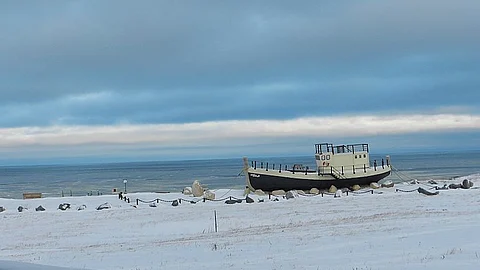

With the spectre of a deepening US trade war on the horizon, Manitoba is fast-tracking efforts to diversify its trade routes and break down longstanding interprovincial infrastructure barriers — including support for a second Hudson Bay port and a major hydroelectric and fibre optic corridor to Nunavut.
Premier Wab Kinew this week signalled his government is open to a long-discussed second Arctic port near the mouth of the Nelson River, south of Churchill. The shift comes as Manitoba hosted a high-level delegation of ambassadors from the European Union and 18 member states, eager to deepen trade in clean energy, critical minerals, and agriculture.
“We need to turn this period of turbulence into a period of opportunity,” Kinew said after meeting with EU diplomats. “Canada needs alternative export routes — and that includes looking seriously at another port on Hudson Bay.”
While Churchill remains the province’s only Arctic deepwater port, its seasonal limitations and proximity to environmentally sensitive wildlife habitats have revived interest in the Port Nelson site.
First proposed over a century ago, Port Nelson is now at the heart of the Cree-led NeeStaNan Utility Corridor — a proposal to ship Canadian LNG, fertilizer, potash, and minerals through the Arctic to Europe and beyond.
The plan has gained traction not just in Manitoba, but nationally. Alberta Premier Danielle Smith has advocated for utility corridors to give landlocked provinces access to tidewater, while federal leadership contenders such as Mark Carney have spoken in favour of “pre-approved” export routes for vital commodities.
In a parallel push for northern infrastructure, Kinew and Nunavut Premier P.J. Akeeagok announced a renewed partnership on the proposed Kivalliq Hydro-Fibre Link — a $1.6-billion, 1,200-kilometre transmission line that would deliver hydroelectric power and broadband connectivity from Manitoba to remote Nunavut communities currently reliant on diesel.
The premiers signed a memorandum of understanding this week and jointly called on Ottawa to fund the next phase of the nation-building initiative.
“In light of trade uncertainty with the US, we’re seeing a real appetite for interprovincial projects that build up the North and connect Canadians,” Kinew said Wednesday. “This is a historic chance to fix gaps in our national infrastructure.”
Kinew pledged an initial 50 megawatts of clean power from Manitoba Hydro to kick-start the project, though he acknowledged it’s just a starting point. Akeeagok emphasized the corridor’s importance to energy security, economic development and First Nations-led growth.
“All the political leaders so far have identified that there’s going to be significant investments in corridors or nation-building projects, and we really see this one aligning really well,” Akeeagok said.
The Inuit-owned Nukik Corporation is leading the project, which has already received $2.8 million in federal funding for design and environmental work. Construction could begin as early as 2028.
Taken together, the port and hydro-fibre link marks a potential turning point in Manitoba’s role as a trade and energy corridor for Canada — reaching both Arctic markets and European buyers bypassing American bottlenecks.
“What Manitoba brings to the table is low-carbon electricity, tidewater, and a government that is serious about working well with Indigenous nations,” Kinew said, adding that both EU leaders and federal candidates have expressed support for such infrastructure.
As Canada prepares for more Trump-inspired protectionism, Manitoba’s government is moving decisively to reimagine the province as a key gateway for Canadian exports and northern development.
“These projects aren’t just about Manitoba,” Kinew said. “They’re about building a stronger, more independent Canada.”
